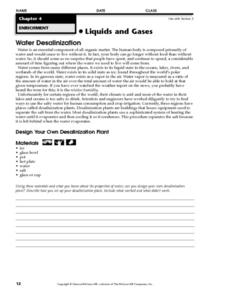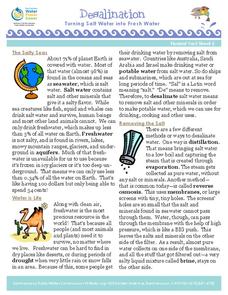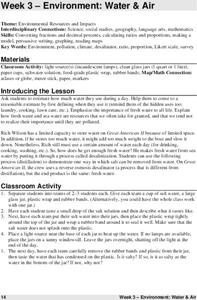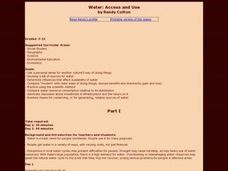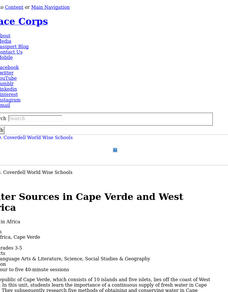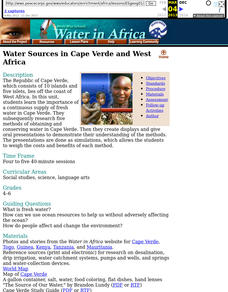Curated OER
Water Desalinization
In this water desalinization worksheet, students will design and construct their own desalinization plant. Then they will describe how they set up their experiment and if it worked or not.
Curated OER
Earth's Water: A drop in your cup
Students complete activities where they observe the amount of freshwater in the world as a fraction of the actual amount of water using different mixtures. In this freshwater lesson plan, students brainstorm on how to preserve...
NASA
The Case of the Wacky Water Cycle
Join the tree house detectives in learning about the processes of the water cycle, water conservation, water treatment, and water as a limited resource.
San Francisco Public Utilities Commission
Desalination: Turning Salt Water into Fresh Water
How does San Francisco supply its citizens with enough water, even during a drought? Learn about reservoirs and why desalination could be a good solution with a reading passage about water conservation. After kids finish the...
University of Waikato
Water Issues
Water may be everywhere but it is not always drinkable. Pupils research water issues, first in a local setting and then with Papua New Guinea and Australia to get a larger world perspective. Teams use the Internet and other...
Curated OER
Environment: Water & Air
The introduction to the instructional activity mentions a sailor's limited capacity to store drinking water on his ship. Pupils then set up an overnight experiment to remove freshwater from salt water by distillation. There is a math and...
San Francisco Public Utilities Commission
What is Drought? No Rain, No Water
How can climate change affect our water supply? Have kids read a passage about the water cycle and water conservation, which includes six questions that challenge them to use context clues.
Curated OER
Water: Access and Use
Students get a personal sense for another culture's way of doing things. Develop a list of sources for water. Practice using the scientific method. Examine means for conserving, or for generating, reliable sources of water.
Curated OER
Water Everywhere: Is There Enough to Drink?
Students examine water supply issues caused by population growth and land use. They read and discuss an article, develop a water usage trivia game, write a news article, illustrate a desalination process, and research aquifer systems.
Curated OER
The Sun as the Driving Force of the Water Cycle
Students study the water cycle and how the sun is an important factor. In this water cycle lesson students investigate how to desalinate water and explore the different densities of fresh versus saltwater.
Curated OER
Survival Still
Lead your class to construct a solar still on campus to demonstrate how water can be extracted from the soil. The power of solar energy is emphasized, as is the concept of how capillary water can be recovered and purified by using a...
Education Outside
Our Water Planet
Fresh water is a precious resource. Most kids don't realize how little of the water on Earth is actually drinkable. This lesson will help to illuminate them on this important topic. They discus the ratio of water to land, where most...
Curated OER
Desalination: Creating a Solar Still
To better understand how solar power can aid in creating desalinated drinking water, the class creates a model still. They will build a model of a solar still, make observations, and discuss how the process works. While the idea behind...
K12 Reader
Water Water Everywhere
The protection of our water supply is the subject of an article used in this cross-curricular reading comprehension worksheet. After studying the passage, readers use information from the text to respond to a series of comprehension...
Curated OER
Water Sources in Cape Verde and West Africa
Learners analyze the importance of a fresh water supply in Cape Verde, researching five methods of obtaining and conserving water there. Students create and present displays demonstrating their understanding of the methods of water...
Southwest Florida Water Management District
WaterWeb - Conservation and Water Supply
If 71% of our planet is covered with water, why do we need to bother conserving water? Find out with these activities designed for middle and high school environmental scientists. From reading articles to solving crossword puzzles, to...
Curated OER
Water Quality Issues
In this unit of lessons, students examine water quality issues. They discover ways they can conserve water and practice making drinkable water from water desalination.
Curated OER
Water Purification
Students develop an understanding and appreciation of water purification techniques and their implications for health maintenance.
Curated OER
Water: to the Last Drop
Students research how water played an important role in US history. In this social studies lesson, students make a mock newscast from one of the events they researched. They present their newscast to the class.
Curated OER
Water Sources in Cape Verde and West Africa
Young explorers study the scarcity and importance of a continuous supply of fresh water in Cape Verde. They research the five main ways that fresh water is obtained in these countries. Each research group prepares a presentation, and...
Curated OER
Water You Can Use from the Air Conditioner
Students work together to research water quantity, quality and safety standards. They complete a lab to discover how to use the water from an air conditioner. They write a paper to show their findings.
Curated OER
Water Water Everywhere and Not a Drop to Drink!
Students describe limitations of fresh water resources on ships at sea. They realize the value of fresh water on the ocean and around the world. Students gain a knowledge of the process and economic cost of desalinization.
Curated OER
Fresh or Salty?
Students explore water bodies on the planet Earth and their various uses and qualities. They examine several ways that engineers are working to maintain and conserve water sources and think about their role in water conservation....
Curated OER
Rain Machine (Solar Still)
Students experiment with a solar still. In this distillation lesson, students find a simple way to use evaporation to make salty water drinkable.


